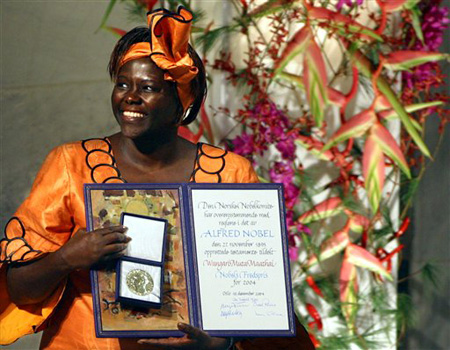
Wangari Maathai holds her Nobel Peace Prize and certificate in 2004. Maathai, a Kenyan ecologist, was the first African woman and the first environmentalist to have won the coveted prize. She died on September 25, 2011, at age 71. Photo by John McConnico/The Associated Press.
The first time anybody ever hit me hard as an adult and meant it was in Nairobi, Kenya in November 2006. It was during a United Nations conference on climate change. Nobel Peace Prize winner Wangari Maathai and other leaders of her Green Belt Movement were scheduled to speak at a press conference near United Nations headquarters. The pugilist was a Kenyan security agent, dressed in suit and tie, who wanted me to stand in the back of the room with the rest of the broadcast media. But my recording equipment wouldn't pick up voices from that far away and I was determined to be near the dais.
Thwack!
The Kenyan agent looked angry. Mistaking me for another Kenyan, and seeing that I was a woman no less, he thought he could muscle me out. The agent jerked his head toward the back of the room and said something in Swahili.
“What is WRONG with you,” I yelled.
In walked Maathai and, as if ascertaining the situation by osmosis, she greeted me like we were old friends. The irony, of course, was that she and I had never met. The security agent grumbled and moved away. I got my tape. Maathai planted a tree and gave me a lift home.
It would be the first of many times Maathai came to the rescue during my reporting years in Kenya—helping me when she didn't have to, happy to be interviewed on or off the record and willing to explain the complicated political shenanigans that have held Kenya back for so long.
Maathai was awfully good at handling people, which makes you wonder how anyone would have the temerity to hit her hard and mean it when she was defending Nairobi’s green spaces against developers and their concrete mixers. But they did hit her. Again and again. And yet, somehow, Maathai made it to the other side, smiling.
At her daughter’s traditional Kikuyu wedding a few years ago, Maathai chatted easily with her ex-husband, the same man who had tried to force her to give up her married name when they divorced. Kenyan women do not give up their married names easily. So that's why there are three A’s in “Maathai.” She added an extra “a” to get him off her back.
Maathai was at her most appealing when she was at her most practical. One afternoon in 2008, during the worst of the post-election violence that had paralyzed Kenya—a time when she was receiving death threats—Maathai sat on the pavement in the parking lot of a four-star hotel and, while rubbing her legs, ran through the history of the democratic reform movement in Kenya. When she was done, she got up, dusted off her purse and went home.
At a funeral in 2009, when a thief snatched my friend Debi Williams's purse, Maathai had the entrance and exits of the area closed and looked under tables and chairs herself to find it. There's no feeling like the feeling you get when you see a Nobel laureate conducting a hard target search for a bag that probably held about 15 dollars and a United States passport. She didn't find it.
But in the end, I don't think Maathai was kind to me because I was so charming, or
influential or for any particular attribute I brought to our acquaintance. She treated me well because we had a mutual friend.
Vertistine Mbaya is an American academic who has lived in Kenya since 1960. She and Maathai were friends for much of that time. Mbaya can remember the days when zebras walked down Nairobi's main streets. She used to tell me all about those early days during our marathon lunches, which sometimes lasted until nightfall. Mbaya would also tell me about her and Maathai hiding out from security agents loyal to Kenya's then-president Daniel arap Moi, a man who was reportedly in league with the developers. Had Moi known where they were, or how much fun they were having at his expense (Mbaya and Maathai count among the world's great laughers), he might have directed his agents to look harder.
In the language of young people today, she and Maathai were BFFs, “Best Friends Forever.” They helped one another through marriages, raising children, burying children, and through the vagaries of public life. They taught at the same university and together are the founding mothers of the Green Belt Movement. Though I do not know their religious convictions, when I think of these women I am often reminded of a sermon written by that other Nobel Peace Prize laureate, Dr. Martin Luther King, Jr., specifically, the part when he says, “… we will be able to work together, to pray together, to struggle together, to go to jail together, to stand up for freedom together, knowing that we will be free one day.”
It’s amazing how well those lines describe people's lives half a world away.
On the strength of mutual values and respect, two friends—one Kenyan, the other American—were able to change the world for the better. Maathai's life made it possible for millions of much-needed trees to exist on this planet. Because of her, untold numbers of women are finding their voice. Her death hurts us all. But I can't help thinking that this turn of events has interrupted one of the world's great friendships. Truth is, “Best Friends Forever” is never quite long enough.
Gwen Thompkins, a 2011 Nieman Fellow, was the NPR East Africa correspondent from 2006 until her Nieman year. While in Africa, she covered nine countries, including Kenya, Sudan, Somalia and eastern Congo. She is currently writing a book of short stories in New Orleans.


